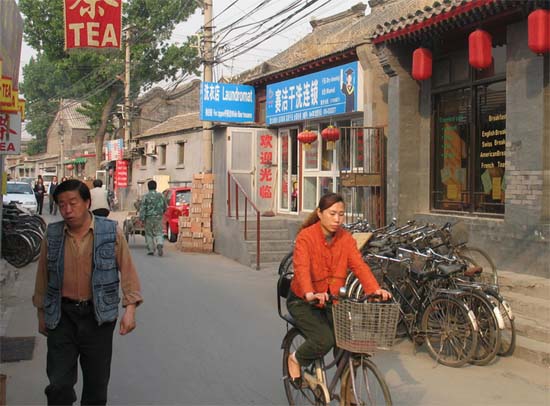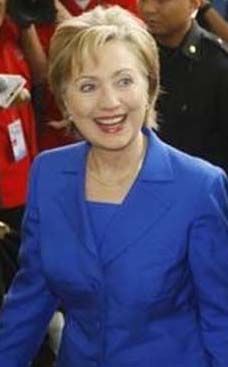
"While no one should have to live in poverty, no matter how picturesque, the lanes’ melting pot of natives and migrants, laborers and entrepreneurs, old and young, form a safe, diverse community that would be familiar to Mrs. Clinton, author of a text praising the social model of a village. In Beijing, she might note, it takes a hutong to raise a child."
RPCV Michael Meyer writes: China’s American Way of Life
China’s American Way of Life
Mike Meyer
Michael Meyer is the author of “The Last Days of Old Beijing: Life in the Vanishing Backstreets of a City Transformed.”
Caption: Dazhalan by euke_1974 Flickr Creative Commons Attribution-Noncommercial-Share Alike 2.0 Generic
If Hillary Clinton were to step away from photo-ops at the Great Hall of the People and walk 200 yards south past the edge of Tiananmen Square, she would enter Dazhalan — a half-square mile of 114 hutong, or lanes. Home to 57,000 people, this 800-year-old neighborhood exemplifies the sort of urban planning that many American cities seek to recreate, featuring narrow, car-free streets enlivened by a tight-knit community. Mrs. Clinton should visit the area while it’s still there; wide roads are slated to pierce through the heart of this historical center, where a new boutique mall and a Wal-Mart already shadow its edges.
To rationalize their destruction, city officials call these neighborhoods slums. They are not. As blighted as their single-story courtyard homes may be — most lack central heat and toilets — the hutong do not cause pathologies, but instead foster the type of civic life absent in Beijing’s high-rise apartments, partitioned by security guards, fences, multilock doors and a lack of public space.
While no one should have to live in poverty, no matter how picturesque, the lanes’ melting pot of natives and migrants, laborers and entrepreneurs, old and young, form a safe, diverse community that would be familiar to Mrs. Clinton, author of a text praising the social model of a village. In Beijing, she might note, it takes a hutong to raise a child.
While fewer than one-eighth of the capital’s lanes survive, it may seem beyond our top diplomat’s authority to lobby for their preservation. Certainly, Mrs. Clinton’s Chinese counterpart could counter with some choice observations of Washington. (Prince Charles, who has never visited Beijing, recently launched a project with a Chinese university to modernize the lanes’ housing.)
Yet as modernizing Chinese cities emulate America’s car-friendly designs — and often employ American architects, but not clean-energy firms to realize it — she could tie China’s urbanization into her broader agenda of engaging Beijing in a partnership to reduce emissions and increase energy efficiency, measures that would affect global health and the economy.
“If Chinese want to live the American way of life, then we need seven earths to support them,” the founder of China’s first environmental nongovernmental organization once told me. That impact is of less concern to a government funding large-scale urbanization in the service of economic growth. Planners and officials here often insist, with rightful indignation, that “we have every right to make the same development mistakes that America did.”
Mrs. Clinton could correct that perception with a visit to the hutong the way her husband galvanized AIDS awareness when he hugged an H.I.V.-positive girl at a Beijing speech in 2003. Photos of that encounter still circulate, and AIDS prevention is one of the few positive issues that link Sino-American exchanges. Smart growth could be another. By placing the same importance on development as the countries apply to trade and security, China can learn from the United States’ planning mistakes, while also showcasing its huge investment in national infrastructure — airport expansions, bridge-building, high-speed rail projects.
When I first arrived in China as a Peace Corps volunteer in 1995, an American diplomat counseled, “Forget democracy. You’re here to create future Pepsi drinkers.” So here’s a suggestion in turn: Mrs. Clinton, forgo a tour of Beijing’s restored palaces and impressive Olympic venues. Instead, take a short walk down to Dazhalan’s narrow lanes, and as the flashbulbs pop, simply say, “This is the type of neighborhood I wish America had more of.” If she’s thirsty, Wal-Mart’s wide aisles are crowded with Pepsi.












